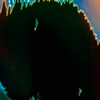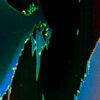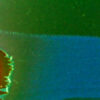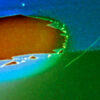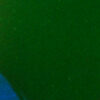Dreaming is a Form of Knowledge Production
Nobody’s immune to their ego taking the wheel.
Dreaming is a form of knowledge production
& they don’t want it to be that easy for us.
As in: lay your head on a pillow
wake up holding
something new. I said what I said, not what you say
I said. Pigs are outside the house, but next door
this time. It’s not something our relationship
will be able to survive. He doesn’t show it, the cat,
but he loves me so. He has the gene but it hasn’t
kicked in yet. Another thousand years. All thinking
& no feeling. Shut up about Freud.
six weeks
what if I gave you a name, & it made remembering easier. I am a person who tries to keep things. I am a girl, also, who forgets she is a woman nowadays, with a body that does womanly things, at times undoes them, unfastens the sound wuu-man like a cord from around the neck.
–
had a heartbeat, lost it. had a mind, almost, then changed it. at six weeks, a heart begins to beat, like a coin starting to roll, a new idea, a lightbulb, a streetlamp turning on at dusk just as you pass it walking home.
–
how often does this happen?
–
all of this made us want you; made you wantable & imminent.
& then,
something other in me, or you, or the universe, had a change of heart, tugged the rope a little harder & won. & there, finally, like that: the meaning of dialectics. the inner workings of things not visible to us. only their push & pull being felt, & us the children in the divorce. forces we know are there but can’t see; five senses not nearly enough. known unknowns that make us humble ourselves, choose the right place in the hierarchy & hold out our hands for what is not promised
–
. . . in the empty space, I want to think of you deliberately. do something.
create a national holiday in your namelessness, in my head.
close the banks & write a poem. burn a candle. buy a plant & water it.
when you fell, warm, into my hand I put you into a jar. wrapped the jar in newspaper. placed it on the dressing table & slept, awed, across the room, non-dreaming. when I woke up, I put you into the fridge.
–
the nurse’s name was Valentine, Zimbabwean, & so kind I called her auntie. the train I write this from is passing a cemetery now. I am more used to travelling in darkness but today I see it: the place for everything in life. literal, not figurative, the graves – with my eyes I take them in. I would like to walk between them, slowly, leaving brief & careful tellings on the air with my breath.
The Ultra-Black Fish
Two hundred metres down, the light stops.
Many deep-sea creatures alive at this level
of the ocean have developed the ability to create
light for themselves. This is known as bioluminescence.
Others, on the contrary, contribute to the darkness
by adding themselves to it. Ultra-black fish are
one example, & in 2020 sixteen varieties of these were
discovered captured. The level of pigment in their
skin was so high that it was found to absorb 99.956%
of the light that touched it. Karen, a marine biologist,
made the discovery came across them by accident.
Instead of hauling up the deep-sea crabs she had been
searching for, her net produced a fang-toothed fish that
wouldn’t show up in a photograph. Held, later, in a tank
under two strobe lights, the fish became a living black hole,
with no discernable features beyond the opacity of its
silhouette. As though it had cut itself out of the image & left.
Scientists believe that the fish developed their invisibility
to aid them in escaping their predators. Another theory
suggests that the obscurity of ultra-black fish enables them
to more successfully catch their prey. It is likely that both
ideas are true. Commentators on their discovery have also
speculated that the chemical structure of the pigment could serve
the development of military & defence technologies.
Nothing was said, however, about how ultra-black fish find
& enter into relations with each other. Nonetheless, their existence
alone is evidence that, invisible as they may be to others,
they are by no means strangers to themselves.


